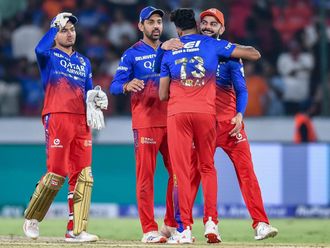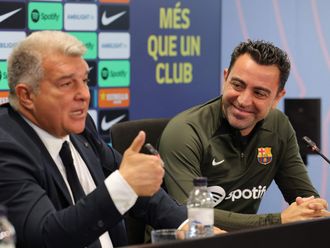Rory McIlroy leads the world of golf, if not yet in ranking points or major championships won, then certainly in the unfashionable art of being up front. He is a muscular 22-year-old these days and there is, too, a muscularity about the way he tackles interlocutors.
Ask me and I'll tell you, the body language says. Nothing is off limits. "I have always said I will try to answer questions honestly," he says. "I don't want to change that about myself. I think people appreciate that about me."
Is this real or an act? There is no better way to find out than to start with the most painful experience of his young life. How did he feel when he threw away his chance of winning the Masters in the full gaze of the watching world? On the 13th tee (where he snap-hooked his drive into Rae's Creek, one more humiliation on a day of many), he looked ready to burst into tears.
"I definitely felt like crying because the drive on the 13th was the one that took all my chances away," he says. "But I didn't actually cry until the next morning, when I spoke to my mum and dad. I spoke to them before I went to the airport. My mum might have said something like: ‘Oh don't worry Rory, everything will be okay' and I just blubbed back: ‘No, it won't be OK!' It was one of those things. There were so many thoughts and emotions going through my head. At the time it felt like the only chance I would have of winning at Augusta and I blew it.
"When did I last cry over golf? I dunno, when I was kid probably. It's not worth crying over, is it? It's only a game."
Since that ghastly Sunday afternoon at Augusta, so much has happened to the Northern Irishman professionally and personally, it is hard for an outsider to comprehend, though McIlroy himself has little difficulty in summing up 2011. "The year I grew up," he calls it.
Reassuring
Eight weeks after Aug-usta, McIlroy was back on centre stage at Congressional Country Club, tearing the field apart over the first three days of the US Open and heading into the final round once again with a substantial lead. This time there were no slip-ups and no tears. He won by eight shots, then stepped into the warm embrace of his father, Gerry.
"It was important to have my dad there that week. He kept me calm, he said all the right things things that were more reassuring coming from the person who knows you better than anyone else in the world," he says when asked to explain how he was able to restore his game and his morale so quickly and completely.
"On that Sunday of the Masters I remember turning on ESPN to find people talking about me. I switched over to the Golf Channel and people were talking about me. It was hard to escape. Greg Norman said something to me afterwards that stuck — that any outside influence you let into your bubble can be detrimental, even if it's just an article in a newspaper. You have to have a lot of self-discipline not to read and watch anything about yourself, but that's what I will try to do from now on."
Difficult
This will be difficult for someone who once supposedly had a Google alert on his iPhone which helpfully fed stories featuring his name into his email inbox. It will also be difficult for someone who, in keeping with many modern athletes, feeds so hungrily on the very criticism he professes to ignore.
"Part of the motivation I had [at the US Open] was trying to prove something to myself, that I wasn't one of those players who crumbles under the pressure, who folds, or chokes. I hate using the word choke, but that's exactly what happened at the Masters. I also wanted to prove people wrong, whether it was the media or just critics in general. I wanted to show them that the person they saw on Sunday at Augusta was not the real Rory McIlroy."
McIlroy followed his triumph at Congressional with headline-making appearances in the final two majors of the year, albeit that the headlines were not exactly positive. At Royal St George's he arrived as the favourite for the Open and departed as a vaguely ludicrous figure after complaining he didn't like playing golf in the wind, which is a bit like Chris Martin saying he doesn't like singing songs in front of big crowds.
In Ireland for his national open tournament a couple of weeks later, he played with little distinction but battled memorably on the social network site Twitter with the American television commentator Jay Townsend, who had the temerity to criticise his caddie JP Fitzgerald for a myriad perceived failings. "Shut up," McIlroy wrote. "You're a commentator and a failed golfer. Your opinion means nothing."
Carried away
At the PGA Championship in Atlanta, his favourite's chance disappeared at the third hole on day one when, to the bewilderment of many, including the faithful Fitzgerald, he took a swipe at his ball when it was lodged in the root of a tree off the fairway and hurt his wrist. He struggled on for 69 holes but never had a chance.
Regrets? He had few this year but almost too few to mention. "Probably what I said to Jay Townsend," he concedes. "I got a bit carried away there. I would have still have had a go at him, but I would have phrased it differently. But overall I feel the decisions I have made have been good for me."
The rest of his golfing year was an exercise in sustained brilliance. He won twice, in China and Hong Kong, finished outside the top five only once and, according to best estimates, picked up more than £5 million in prize money and appearance fees. That is quite a haul by anyone's standards. Throw in his many and varied multi-year, multimillion-pound sponsorship deals and it is clear that finances will no longer factor much into his career decisions. Henceforth, he will be playing for the history and glory, not the cash.
Vulnerable
To the outsider, McIlroy is especially vulnerable because unlike, say, Lee Westwood and Luke Donald, he oozes star quality. "Why me?" he says when asked to explain his elevated status as a rock-star athlete. "I don't know. Is it the way I play golf? My afro? I seriously don't know."
Maybe so, but he is hardly oblivious to the effects of his own charisma, the most obvious of which is that every move he makes causes ripples.
Twenty-four-hour scrutiny drives many people in his position into hiding, or at least some form of enforcement seclusion. Not McIlroy. He might not chase attention, but he doesn't flinch when it comes his way, otherwise why would he throw himself into a relationship with the tennis player Caroline Wozniacki, one of the most high-profile female athletes in the world.
"This is going to sound cheesy, but meeting Caroline is probably the best thing that's happened to me off the course," he says without embarrassment.
McIlroy is just as forthcoming on the other major change in his life away from the course. Next year he will rejoin the PGA Tour, basing himself in the States for lengthy periods. This self-imposed exile might serve as fuel, perhaps, for the inevitable accusations that he is abandoning his roots. "Home will always be Northern Ireland, but my schedule means for the next few years I won't be there as much," he says.
Born: May 4, 1989 (Holywood, County Down, Northern Ireland)
Height: 1.75m (5ft 9in)
Turned professional: 2007
Current world ranking: 3
Professional wins: 5 (1 major)
Best performances in majors: US Open — won (2011); The Open Championship - T3 (2010); PGA Championship - T3 (2009, 2010)








